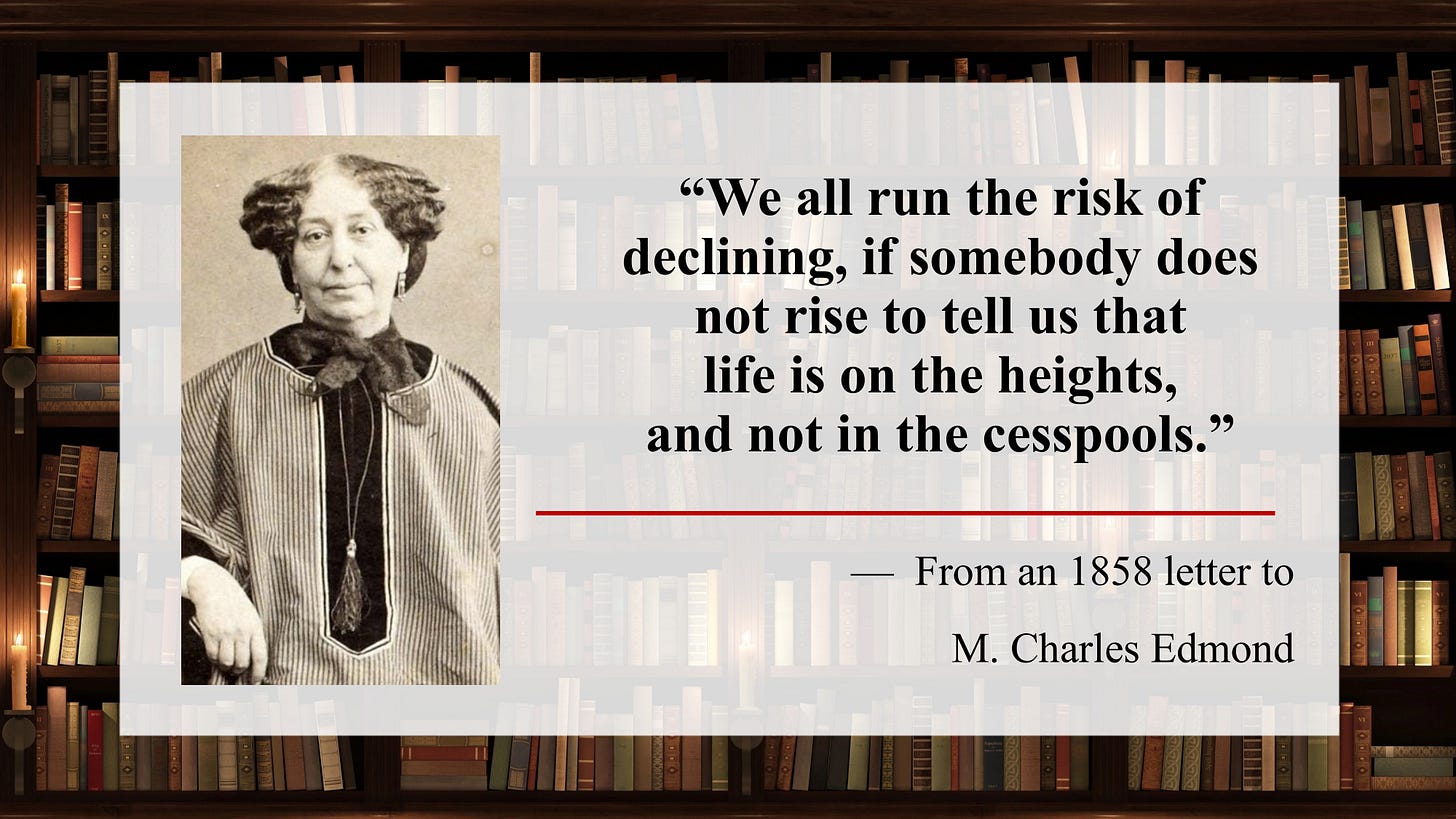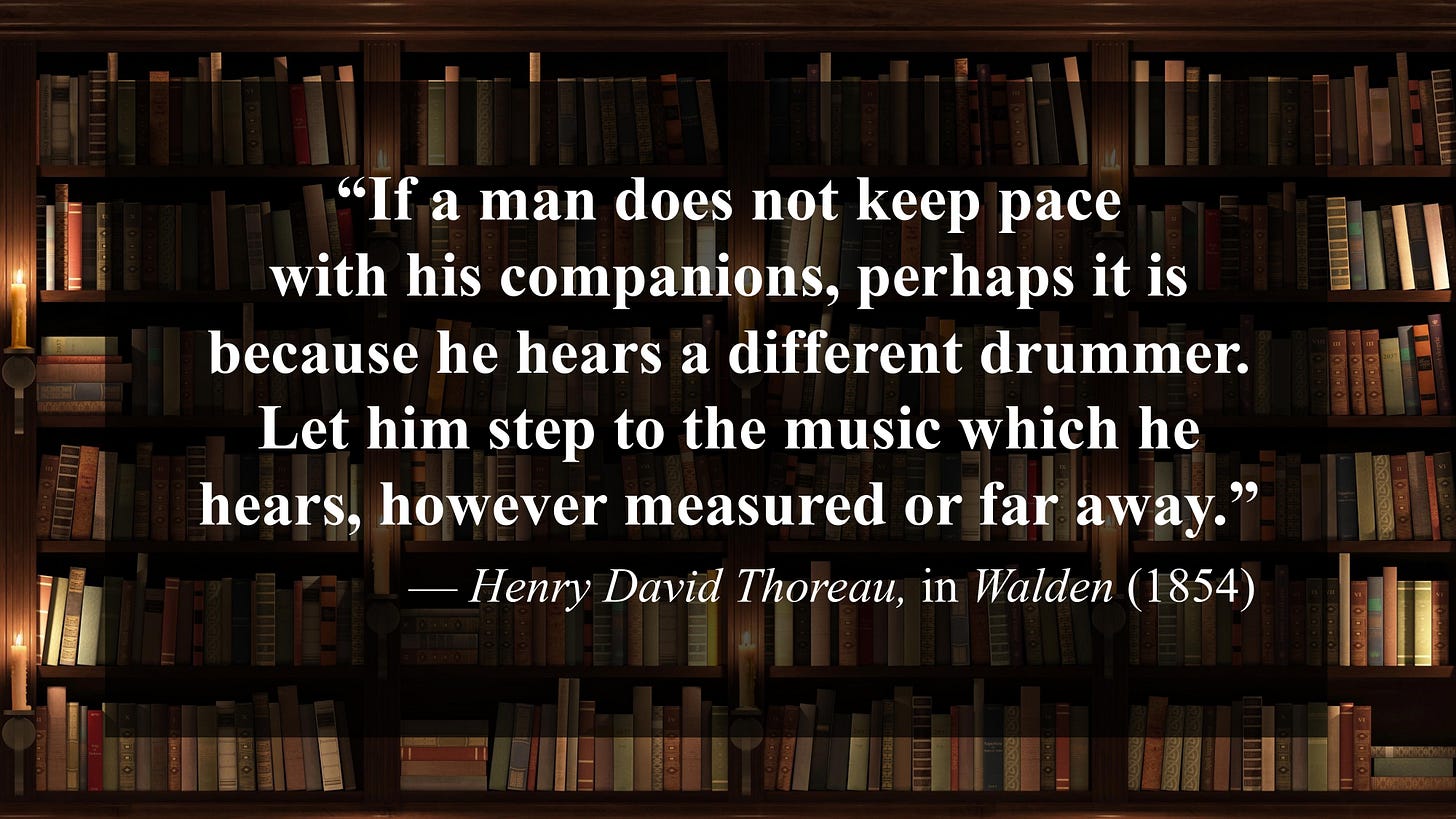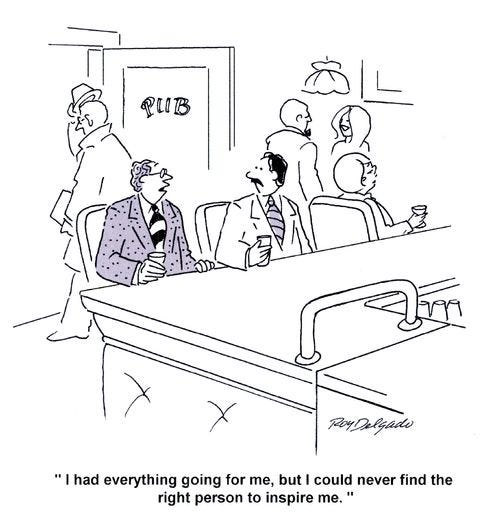Dr. Mardy's Quotes of the Week (“Inspiring Words")
Jan. 19-25, 2025 | THIS WEEK'S THEME: “Inspiration—Part Two: Inspiring Words"
Opening Line of the Week
In most self-help books, the author’s primary goal is not to craft an attention-grabbing “hook,” but rather to begin in a warm and welcoming way. I think you will agree that Dyer does that very nicely here.
In the opening paragraph, he continued: “I’ve written this book with the paramount idea of showing you what I’ve learned about this magical concept.”
For more than 2,000 memorable literary openers, go to www.GreatOpeningLines.com.
This Week’s Puzzler
On July 1, 1804, this famous female writer was born as Aurore Dupin in Paris. Born into an aristocratic French family descended from Polish royalty, she was only four when her father—an officer in Napoleon’s army—died after falling from a horse. After his death, she was raised by her paternal grandmother in the village of Nohant in central France (now a major tourist attraction).
As a child, young Aurore displayed such an unusual interest in boyish things that her grandmother agreed to let her wear boy’s clothing and engage in activities traditionally off-limits to girls—and thus were sowed the seeds of her lifelong fascination with androgyny.
Only seventeen when her grandmother died in 1821, she wedded an aristocratic suitor the following year. It turned out to be a deeply unfulfilling marriage, though, and after ten unhappy years, she moved to Paris to embark on a literary career.
Shortly after arriving in Paris in 1831, she adopted a masculine nom de plume and experienced immediate success with steamy and sensational novels that featured strong female heroines who were fighting to expand the severely limited roles available to 19th-century women.
She went on to become one of history’s most famous novelists—and one of the most prolific. When she died at age 71 in 1876, she had produced a staggering body of work: over 70 novels, 24 plays, hundreds of short stories and essays, a similar number of poems, a remarkable memoir, and thousands of letters to some of the most famous individuals of the era. As popular in France as Charles Dickens was in England, she was greatly admired by such literary luminaries as Fyodor Dostoevsky, Walt Whitman, and Elizabeth Barrett Browning.
While few modern readers can cite the titles of any of her literary works, almost everyone is familiar with her audacious—some would say scandalous—lifestyle. In addition to her pen name, she dressed in male attire, smoked cigars, took male as well as female lovers, and could dominate a social setting in a manner that would make the most ambitious male politician envious. Her many lovers included some of the most famous figures of the era, including Chopin, Balzac, Flaubert, and the poet Alfred de Musset. Also one of history’s most quotable women, she wrote in an 1866 letter:
Who is this person? (Answer below)
How Have Inspirational Words Affected Your Life?
This week’s Puzzler quotation is a perfect way to begin because it applies so well to me. There were a number of times in my life when I was perilously close to declining into a cesspool—but did not because of a few choice words. Two examples stand out in my memory.
I explored the details of the first in a Substack post over a year ago, so bear with me as I repeat a small portion of what I wrote back then. At age sixteen, after a felony conviction in juvenile court for stealing hubcaps, my life was in major decline. At the suggestion of my guidance counselor, I agreed to meet for a number of "chit-chats.” In one of them, I still clearly recall Mr. Krug saying, “Mardell, I believe you have the potential for greatness.” He went on to add that he was worried that I was going to toss it all away, just like two former students—a recently-deceased alcoholic and a state prison inmate—who he also believed had been destined for greatness.
Walking back to study hall after the session ended, the “potential for greatness” phrase reverberated in my brain. As I settled into my desk, I wrote the phrase over and over again in a spiral notebook. A few days later, I told Mr. Krug that I’d decided to become a psychologist. He was delighted, and suggested that I take a Psychology 101 college correspondence course during my senior year, with him serving as my supervisor.
The entire experience was perfectly encapsulated by this week’s Puzzler quotation. And every time I revisit the memory, I’m also reminded of a famous Albert Schweitzer observation:
When we’re inspired by another person’s words, it’s similar to having an insight. And when we suddenly see something in a new way, it feels more dramatic than simply rekindling a light. For many, including me, it was like the kindling inside me had been ignited. The French military leader Ferdinand Foch was likely thinking along these lines when he wrote:
“The most powerful weapon on earth is the human soul on fire.”
The fire in my soul continued for the remainder of high school and throughout my freshman year of college, where I finished the first year with a 4.0 GPA. After resisting the advances of the college’s many fraternities, I finally joined one—not for any sense of brotherhood, but because I couldn’t resist the offer of free room and board in exchange for “bussing” tables and washing dishes. That decision ultimately proved quite costly, for two years later, I once again found my life in a state of major decline.
I won’t recount the full story here, but if you’d like to read something I wrote about it a little over ten years ago, go here. The short version goes like this. After joining the fraternity, it was like I’d been fast-tracked to become a BMOC (“Big Man on Campus”). I ultimately became president of my fraternity, vice-president of the Student Senate, and an officer in the college pep club that selected cheerleaders for the school’s athletic teams. It looked like I was leading a full and exciting life, but on the inside, I felt small, and cold, and empty. I felt guilty about abandoning my original path, and deeply anxious about where my current path was taking me—and I couldn’t bear the thought of seeing Mr. Krug on my next visit home.
The inner turmoil got so overwhelming that, in the middle of my junior year, I abruptly resigned from all the groups that had previously been so important to me. Lonely and confused, I took a small room in the basement of a dark and dingy off-campus apartment. I was at the lowest and darkest point of my life.
The day before Christmas vacation, I had a brief consultation with Dr. Leo Sprinkle, the director of the College Counseling Center. We didn’t have time for a complete session, but it was long enough for us to develop a bit of a bond. He said he was a big believer in bibliotherapy, and strongly recommended that I read Henry David Thoreau’s Walden (1854) before our next appointment in January.
I began reading Walden on January 1, 1963. Like so many books written more than a century earlier, it was not an easy read. After many dull or uninteresting pages, though, a gem would pop out, like “I wanted to live deep and suck out all the marrow of life.” As I began the final chapter, I viewed the book as interesting but not exactly scintillating. And then I came across the following words:
In these two sentences, Thoreau gave words to a voice that was speaking so softly from deep inside me that I could not hear what it was saying. I was so moved, I immediately wrote the passage on a three-by-five inch index card and thumb-tacked it on the wall above my desk. Why was Thoreau’s observation so inspirational? Years later, I came across a quotation from the American psychologist Rollo May:
“Depression is the inability to construct a future.”
It’s a brilliant observation, in my view, and it describes every depressed person I’ve ever met—including me back then. Thoreau’s observation provided a glimpse into a different kind of future, one where I didn’t have to sacrifice the real me, and could do just fine by heeding the stirrings of my own soul.
My experience with Thoreau’s distant drummer observation was so personal to me—and so idiosyncratic to my world—that there was no way for me to know then what I know now. Over the centuries, untold numbers of distressed people have had an experience similar to mine. In an 1844 novel, Benjamin Disraeli expressed it well:
By the way, when I went back to see Dr. Sprinkle in January for my next appointment, I was happy to report that my depression had almost completely lifted—and Mr. Thoreau had a lot to do with it. But was I truly back on track? We’ll have to let the record speak for itself. A little more than a decade after first reading Walden, I received my Ph.D. in psychology from Teacher’s College, Columbia University in 1974.
This week, take a few moments to reflect on any inspiring words—spoken or written—that have awakened you from your slumbers or set your soul on fire. If you’d like to share the experience, please use the “Comments” section below. As usual, I've assembled a number of quotations to assist you in your reflections:
By words the mind is winged. — Aristophanes
Without inspiration the best powers of the mind remain dormant; there is a fuel in us which needs to be ignited with sparks. Author Unknown, but widely attributed to Johann Gottfried von Herder
QUOTE NOTE: I used this beautiful observation for more than twenty years in my “leadership” seminars, and it was extremely popular with participants. While I attributed the saying to von Herder in my talks, I’ve since learned that the words have never been found in his works.
The person who tries to live alone will not succeed as a human being. His heart withers if it does not answer another heart. His mind shrinks away if he hears only the echoes of his own thoughts and finds no other inspiration. — Pearl S. Buck
I pick up favorite quotations, and store them in my mind as ready armor, offensive or defensive, amid the struggle of this turbulent existence. — Robert Burns
The greatest good you can do for another is not just to share your riches but to reveal to him his own. — Benjamin Disraeli
Words are, of course, the most powerful drug used by mankind. — Rudyard Kipling
There is no eloquence which does not agitate the soul. — Walter Savage Landor
Words are more powerful than perhaps anyone suspects. — May Sarton
Inspiration is the greatest gift because it opens your life to many new possibilities. Each day becomes more meaningful and your life is enhanced when your actions are guided by what inspires you. — Dr. Bernie S. Siegel
I think of quotes as mini-instruction manuals for the soul. — Cheryl Strayed
For source information on these quotations, and many other quotations on the topic of INSPIRATION, go here.
Cartoon of the Week
Answer to This Week’s Puzzler:
George Sand (1804-1876)
Dr. Mardy’s Observation of the Week
Thanks for joining me again this week. See you next Sunday morning.
Mardy












Mardy,
Another great week of quotes and inspiration! Many books & quotes have influenced me but if I had to pick one - which you challenged us to do - I would choose the quote by Annie Dillard, “How we spend our days is, of course, how we spend our lives.” I think of it often and when I first heard it, a jolt of inertia surged through my body. I realized I needed to stop waiting for inspiration, for tomorrow or “some day” to have the life I wanted. My life is just a series of daily habits that I choose (thoughts, words, actions) that really matter, in fact, it is all that matters.
Thank you for being a part of my life Mardy! You are truly an inspiration!!
Mardy, I hope you realize how much your weekly words inspire us, your readers. A story goes about a young teacher who visits an old professor and asks, “Sir, what is the secret of teaching?” The professor says, “Half of teaching is encouragement.” “Thank you, sir. Tell me. what is the other half? “The old man says, “Encouragement.” Perhaps the words that inspire us most in life are words that encourage us.